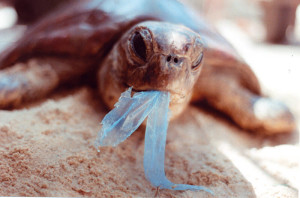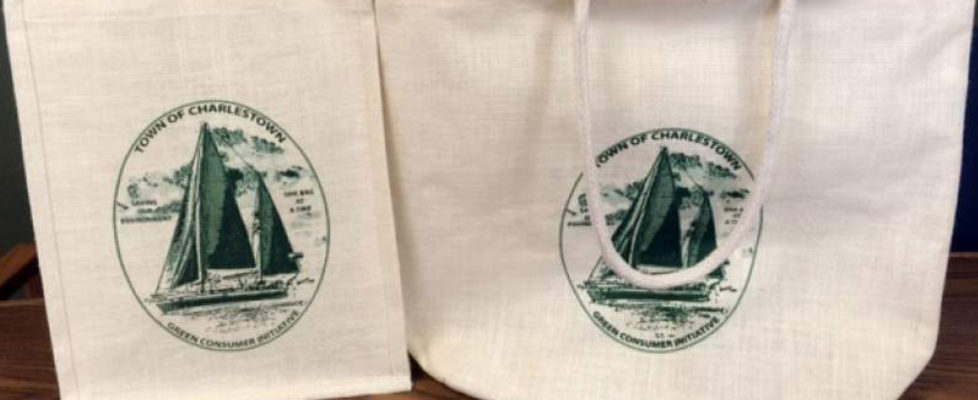Charlestown’s Reusable Tote Bags a Success
The following letter appeared in local newspapers and is shared with us here by the author George C. Tremblay. Mr. Tremblay is a member of the Charlestown Town Council.
Single-use plastic bags, the bags we are given to carry our purchases from a store, are a major source of plastic pollution, a health hazard to aquatic animals and an eyesore as litter along our roadways. Last May, the Charlestown Town Council approved up to $10,000 to underwrite costs for distributing reusable tote bags in an effort to reduce single-use plastic waste.
 Statistics on the environmental impact of disposable plastic can overwhelm our capacity to comprehend. Eight million tons of discarded plastic finds its way to the world’s oceans each year, a rate at which plastic waste will outweigh fish by 2050. Unfavorable economics limits recycling of these bags to only 5 percent. It’s fair to ask, “Where do we start to reverse this trend?”
Statistics on the environmental impact of disposable plastic can overwhelm our capacity to comprehend. Eight million tons of discarded plastic finds its way to the world’s oceans each year, a rate at which plastic waste will outweigh fish by 2050. Unfavorable economics limits recycling of these bags to only 5 percent. It’s fair to ask, “Where do we start to reverse this trend?”
The Charlestown Town Council decided to ban single-use plastic bags from municipal properties, but against banning them town-wide. Instead, the council favored a program to subsidize the sale of reusable tote bags to discourage domestic consumption of single-use plastic bags.
We located a manufacturer in India with “Fair Trade” certification (AARBUR, Kolkata) to supply us with reusable tote bags made from natural jute fiber. Steve McCandless, our computer-whiz GIS map maker, created an attractive logo of a passing sailboat to imprint on the bags, under the header “Town of Charlestown Green Consumer Initiative.”
Reaction to the design and quality was so favorable that we abandoned an earlier plan to sell advertising on one side of the bag, and decided instead to have our copyrighted logo printed on both sides. Retailers saw the appeal of the bags to tourists as souvenirs. A special thanks goes to Charlie Beck of the MiniSuper and Mike Dennen of Hungry Haven for their helpful advice.
The town bought two sizes of tote bags at $3.65 to $4 each. About a dozen local merchants agreed to purchase the bags at $2 each, and sell them without mark-up. Each bag included a one-page description of our program, and a bumper sticker decal with the same logo as that on the bags. We began distributing to merchants in mid-June. In addition, Michele Voislow, assistant to the town administrator, enthusiastically advertised and sold tote bags to the public out of her office in the Charlestown Town Hall.
By summer’s end, the town sold 1,662 bags and bumper stickers. We spent $8,121 and recovered $3,394 for a net cost of $4,727. Either half the households in Charlestown bought a bag, or tourists snapped them up. In either case, the bags carry the message wherever they go, and their use will reduce plastic waste.
The collateral promotion of summer tourism merits further attention. The town is able to buy in bulk, whereas each merchant may not be so inclined. The bags were so popular that merchants indicated they could buy them at full price, and sell them at a profit. This suggests the town might promote its tourist economy by serving as a wholesale supplier to retailers at full cost.
We can’t quantify the impact of the program on plastic waste in town, but we are confident it improved public awareness, and that the attractive jute tote bags are in use.

